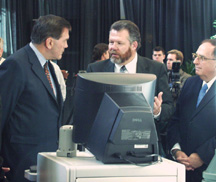Nebraska Sen. Ben Nelson has secured $5 million from the Department of Defense budget authorization and will earmark the money as a “building block” for UNMC’s goal to establish a national bioterrorism center on campus.
 |
Rodney S. Markin, M.D., Ph.D., center, explains components of the automated laboratory system to Secretary of Homeland Security Tom Ridge, left, and UNMC Chancellor Harold M. Maurer during Secretary Ridge’s visit to UNMC last fall. |
In a news release issued by Sen. Nelson’s office on Friday, Nelson said UNMC is the only higher education institution in North America that has developed comprehensive clinical laboratory automation technology, and he hopes UNMC can use the Department of Defense money as a first “building block” to take that technology to the next level.
The money will be used to develop portable and networked automation testing technology to efficiently and rapidly process specimens to detect the existence of biological agents in the event of a biological attack.
“UNMC is leading the way in developing technology to detect and react to a biological attack,” Nelson said. “Securing authorization for $5 million is the first building block to making it a reality. I am proud to have been able to include this important program in this legislation, and I am pleased to assist UNMC’s continued excellence in this area of expertise.”
Rodney S. Markin, M.D., Ph.D., chairman of the board of LAB-InterLink, a UNMC technology transfer company that makes automated laboratory technology, said, “This funding will enable UNMC to develop the technology to enhance our country’s Homeland Security as well as the safety of our troops in battlefield conditions.”
Dr. Markin, who also is president and CEO of University Medical Associates, the UNMC physician practice group, and associate dean for clinical affairs in the UNMC College of Medicine, said the automated laboratory technology provides UNMC with the tools it needs to perform mass screenings of people in the event of a bioterrorism incident.
“We can do these screenings 24 hours a day, 7 days a week,” Dr. Markin said. “The system is capable of testing 1000 specimens per hour, so that means we can do up to 24,000 specimens in a day.”
Dr. Markin said the automated laboratory technology is similar to the unit that was used in a demonstration in the Durham Outpatient Center last November when Tom Ridge, U.S. Secretary of Homeland Security, visited UNMC.
Dr. Markin said in the event of a bioterrorism event, such as the release of the smallpox virus, the automated laboratory technology could be put on a truck, a ship or plane and within hours be at the site of incident.
“We would package it in some sort of isolated shipping container, and it would be anchored to the floor of the container,” he said. “Once we delivered the equipment to the site of the incident, all we would need to start running specimen tests is electricity and a connection to the Internet.
“In essence, with the Internet connection, you can run the system and monitor it by remote control from Omaha. This minimizes the potential exposure to any harmful agents and creates a level of bio-safety that you wouldn’t have with other laboratory systems.”
UNMC Chancellor Harold M. Maurer, M.D., said: “UNMC is especially grateful to learn of this development. We appreciate Sen. Nelson’s assistance in securing this critical funding which will strengthen our efforts to become a national bioterrorism center.”
The Senate Armed Services Committee (SASC), of which Nelson is a member, has oversight responsibilities for the Department of Defense. Each year, the SASC develops the legislation that authorizes the Defense budget. The committee completed its work on the fiscal year 2004 Department of Defense Authorization Act last Thursday. The bill now moves to the floor of the Senate.